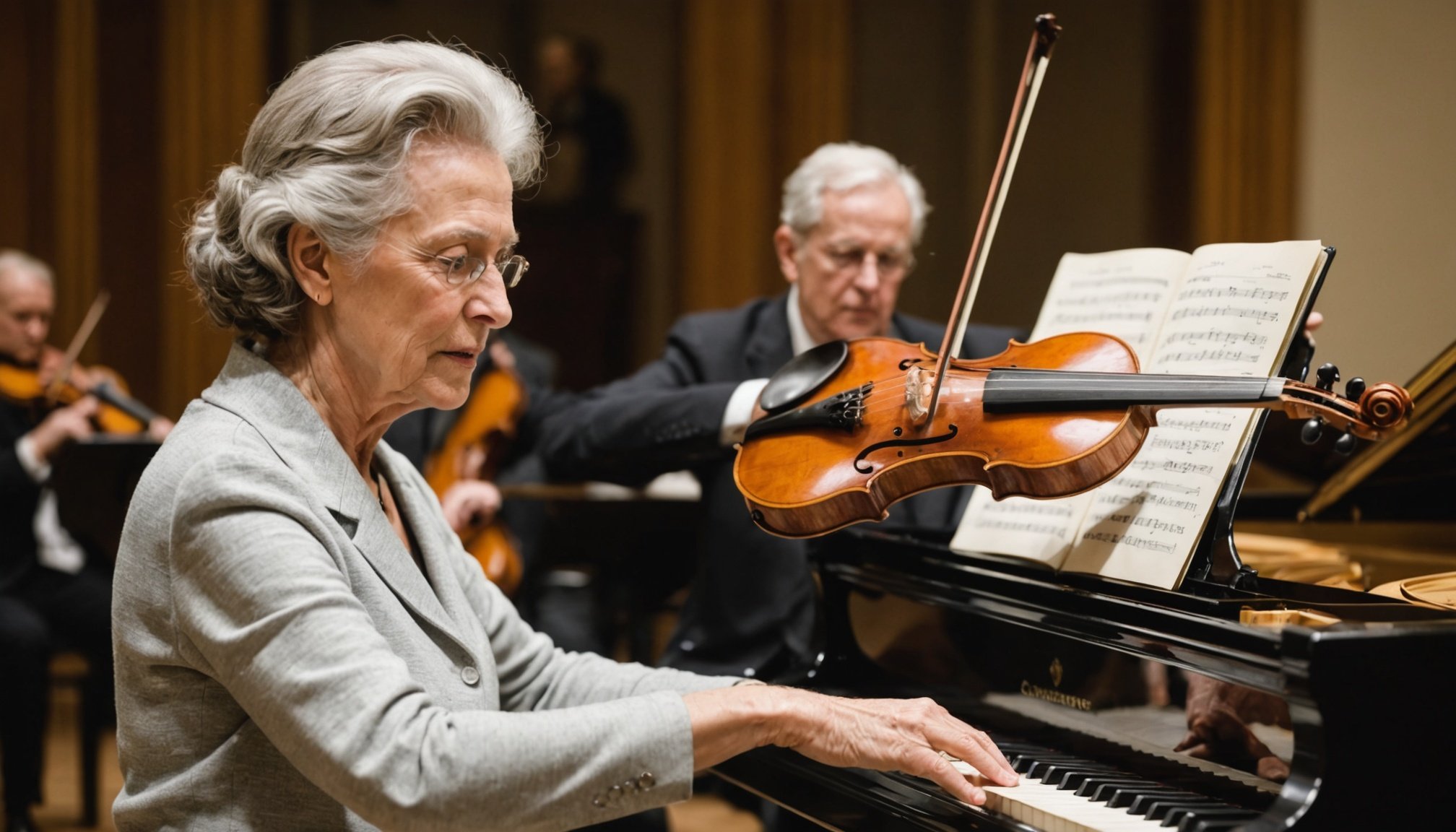Introduction to Classical Music and Cognitive Function
Classical music has long been associated with various cognitive benefits, particularly in enhancing brain function and memory. Research suggests that listening to classical compositions can improve cognitive abilities and memory retention, especially among seniors. The historical use of music therapy underscores its potential in promoting mental health and cognitive vitality.
The effects of classical music on memory enhancement become even more crucial as individuals age. Seniors can face challenges such as memory decline, necessitating effective strategies for cognitive upkeep. Integrating classical music into daily life might offer an engaging method to support this. Engaging with classical music not only provides auditory pleasure but also engages neural pathways linked to memory and cognitive processing.
Also read : Thriving Together: How Community Gardens Enhance Mental Health and Build Bonds
This beneficial relationship is rooted in the brain’s response to musical structure. The complexity and rhythm of classical music, like works by Mozart or Beethoven, stimulate extensive neural activity. This can lead to improved synaptic connections, contributing to better memory function. Additionally, classical music can foster emotional well-being, creating a conducive mental state for cognitive tasks.
Overall, the role of classical music extends beyond entertainment, offering a potential avenue for enhancing cognitive and memory functions, especially in senior populations.
Also to see : Boosting Bonds: The Impact of Pet-Assisted Therapy on Social Skills in Children with Autism
Scientific Research on Classical Music and Memory
Scientific studies have thoroughly examined the role of classical music in enhancing memory and cognitive function. This research underlines the potential benefits that music can provide, especially for seniors.
Overview of Key Studies
Many key studies highlight how listening to classical music can lead to significant improvements in cognitive abilities. For instance, research findings often point to increased brain activity that correlates with heightened memory recall and retention. These studies provide concrete evidence suggesting that music not only entertains but also aids in bridging connections between neurons, critical for enhanced cognitive tasks.
The Mozart Effect
One of the most famous findings in this area is the Mozart Effect. It refers to research indicating a temporary increase in spatial reasoning and intelligence scores after listening to Mozart’s compositions. Though its effectiveness over the long term remains debated, this phenomenon has sparked interest in using classical music as a tool for cognitive enhancement.
Longitudinal Studies on Aging and Music
Furthermore, longitudinal studies focused on seniors have showcased how continuous engagement with music supports sustained cognitive abilities. Over time, seniors exposed to classical music exhibit lesser cognitive decline, exhibiting sharper memory retention than peers not exposed to such auditory stimuli. These studies provide a compelling case for integrating music into daily routines for cognitive upkeep.
Practical Applications of Music for Seniors
Integrating classical music into seniors’ daily routines is not only a stimulating activity but also a strategic move towards cognitive maintenance. Music therapy plays an essential role here, offering tailored approaches to match individual needs. By understanding how to effectively incorporate music, seniors can enjoy enriched mental and emotional health.
Tips for Incorporating Classical Music
For those looking to blend classical music into daily routines, start by selecting pieces aligned with personal preference and activity type. For instance, energising compositions by Haydn or Vivaldi can accompany morning routines, whereas soothing pieces by Chopin or Debussy may be ideal for winding down in the evening. Regular sessions of music listening can enhance familiarity and preference, fostering engaging auditory experiences.
Suggestions for Tailored Music Therapy Programs
Programmes designed specifically for seniors encompass diverse styles and interactive methods. Facilitated group sessions promote social interaction and cognitive stimulation. In home-based settings, technology such as smart speakers allows easy access to a broad range of classical music tailored to specific cognitive goals.
Evidence from case studies reveals that seniors engaging in structured music activities report improvements in mood, vitality, and memory function, reinforcing the effectiveness of this approach. Engaging with classical music represents more than passive listening; it is a proactive step towards maintaining cognitive health.
Psychological Benefits of Listening to Classical Music
Classical music is known to offer various psychological benefits, including improving emotional well-being and reducing stress. These effects can be particularly significant for seniors, who often face challenges like anxiety and mood swings.
Effects on Mood and Anxiety
How does classical music influence mood and anxiety? The precision of this lies in its ability to evoke emotions and reduce cortisol levels. When individuals listen to calming compositions, such as those by Bach or Brahms, they often experience a decrease in anxiety and improved mood. This relaxation results from the soothing melodies and harmonies that classical music provides.
Enhancing Relaxation Techniques
Classical music complements traditional relaxation techniques, such as meditation and deep breathing exercises. By serving as a tranquil background, it helps reduce stress, facilitating a more profound state of relaxation. Seniors might find it beneficial to integrate music into their relaxation routines, enhancing their effectiveness.
Music and Memory Recall
The link between music and memory recall is profound. Listening to classical music activates various brain regions associated with memory, which can assist seniors in remembering past experiences. Engaging regularly with such music can contribute to improved retention and retrieval, making it a valuable tool for cognitive support.
Expert Testimonials and Anecdotal Evidence
Classical music’s myriad benefits have been echoed by numerous experts. Music therapists often highlight the transformative power of classical compositions in enhancing cognitive function and emotional well-being. For instance, renowned therapist Dr. Emily Clarke notes the profound influence of music on memory, stating, “Music bridges the gap in cognitive functions, offering comfort and recall for those with memory decline.”
Personal stories from caregivers and seniors vividly bring to life these claims. John, a caregiver at a senior facility, shares how residents display a notable change in mood and engagement during music sessions. “It’s like watching a flicker of recognition light up their eyes,” he describes. Such anecdotes underscore the personal resonance and efficacy of music in therapeutic settings.
Community feedback also plays a significant role in validating music programs and interventions. Residents of Riverview Senior Village participated in regular music engagement sessions, resulting in overwhelmingly positive community feedback. Participants often report enhanced vitality and reduced anxiety levels. By spotlighting these expert testimonials and personal experiences, we appreciate not only the scientific foundations but also the lived, uplifting impact of classical music on seniors.
Recommended Classical Music Pieces for Memory Enhancement
Discovering the right classical music pieces can significantly enhance memory and cognitive function. Let’s explore some recommendations and how to best incorporate them into daily routines.
Notable Composers and Their Works
For those seeking memory enhancement, composers like Mozart, Bach, and Beethoven offer standout choices. Their compositions, with their intricate structures and rhythms, thoroughly engage the mind. For instance, Mozart’s “Sonata for Two Pianos” and Beethoven’s “Symphony No. 9” are excellent examples of works that stimulate brain activity and promote cognitive abilities.
Curated Playlists for Seniors
Creating curated playlists can facilitate memory retention and provide enjoyment. Tailoring playlists to individual preferences can further enhance the experience. Try integrating a mix of lively pieces by Vivaldi with soothing melodies from Chopin. Regular listening sessions can help seniors become familiar with these pieces, fostering both cognitive and emotional benefits.
Timing and Environment for Optimal Benefits
Timing and environment play crucial roles in reaping the full benefits of classical music. Setting aside specific times for listening, such as during morning routines or before bedtime, can help establish a comforting and cognitively stimulating routine. Ensure a quiet and peaceful environment, allowing the music to be the primary focus, further enhancing its cognitive impact.




